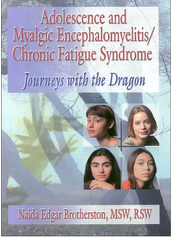
The author of this book, Naida Edgar Brotherston, is a Canadian whose daughter fell ill with a mysterious illness at the age of thirteen. Eventually, the girl was diagnosed with Myalgic Encephalomyelitis or, as it is currently known, ME/CFS. Inspired by her experience with her own daughter, Brotherston decided to pursue a degree in social work and to delve more deeply into the issue of how ME/CFS affects adolescents.
Brotherston begins her book by saying: "Every facet of our lives seemed to be saturated with the fallout from a chronic illness that was not acknowledged as real by many key persons in our lives--indeed, at times we questioned our own perceptions and doubted the evidence of our own eyes. Of course, this meant doubting our child and the reality of her pain. The anguish and divisiveness this caused in our family was heartrending, until we made the decision to trust in the evidence of our own experiences." This statement, in a nutshell, captures the dilemma faced by any parent whose child has ME/CFS. Does one trust the authorities, or does one trust one's own child? Brotherston's decision to trust her child was the correct one, but it took courage. Going against the doctrine of the times is never easy.
The strength of this book lies in the case studies of adolescents who explain how ME/CFS has affected their lives. In short, moving accounts, these young people describe the loss of their hopes and dreams, their abandonment by friends, and, sometimes, family, and the pain of being stigmatized. Brotherston adds her own commentary to these interviews, which, unfortunately, is sometimes too peppered with social work jargon to be useful. (The constant discussion of social work methods is quite off-putting.) In any case, an interpretation is not necessary. These young people can speak for themselves.
If you have an adolescent with ME/CFS, this book will help you to understand the pain your child is experiencing. It may also help you to re-examine your own priorities.

 RSS Feed
RSS Feed
